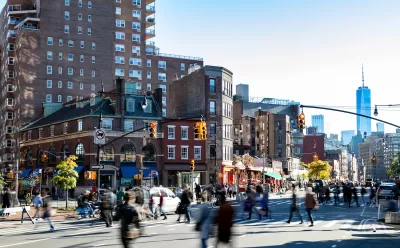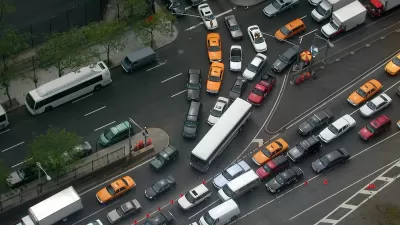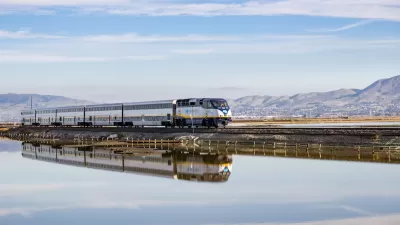Of 35 recommendations presented in the state’s climate scoping plan, just one has been implemented so far.

The suspended congestion pricing plan that would have charged drivers entering parts of New York City is just one of the climate policies the state has backpedaled on in recent months, writes Colin Kinniburgh in a piece for New York Focus.
The Department of Environmental Conservation has not required certain trucks to be zero-emissions. The Department of State has not updated the manuals that cities use for street design. And the state legislature has not taken any of the actions that the scoping plan pushed it to. Most haven’t even been introduced as legislation.
The state’s climate scoping plan “recommends ‘historic investments’ to expand public transit and promote ‘smart growth,’ a form of urban planning that revolves around dense, walkable city centers.” Yet of the 35 policy recommendations laid out in the plan, just one has been completed. “Just over half have seen some signs of progress, ranging from lawmakers introducing (but not passing) bills to agencies administering small grants.”
While the state has made some progress on electrification in the transportation sector, little has been done to reduce overall driving, which the plan admits is crucial to achieving a net-zero future. “Modeling by the clean energy research group RMI found that a 20 percent reduction in driving would not only shave emissions, but also save the lives of thousands of New Yorkers each year by reducing crashes, improving air quality, and promoting exercise.”
FULL STORY: New York Idles on Green Transportation Plan

Study: Maui’s Plan to Convert Vacation Rentals to Long-Term Housing Could Cause Nearly $1 Billion Economic Loss
The plan would reduce visitor accommodation by 25,% resulting in 1,900 jobs lost.

North Texas Transit Leaders Tout Benefits of TOD for Growing Region
At a summit focused on transit-oriented development, policymakers discussed how North Texas’ expanded light rail system can serve as a tool for economic growth.

Using Old Oil and Gas Wells for Green Energy Storage
Penn State researchers have found that repurposing abandoned oil and gas wells for geothermal-assisted compressed-air energy storage can boost efficiency, reduce environmental risks, and support clean energy and job transitions.

Private Donations Propel Early Restoration of Palisades Playground
Los Angeles has secured over $1.3 million in private funding to restore the Pacific Palisades playground months ahead of schedule, creating a modern, accessible space that supports community healing after recent wildfires.

From Blight to Benefit: Early Results From California’s Equitable Cleanup Program
The Equitable Community Revitalization Grant (ECRG) program is reshaping brownfield redevelopment by prioritizing projects in low-income and environmental justice communities, emphasizing equity, transparency, and community benefits.

Planting Relief: Tackling Las Vegas Heat One Tree at a Time
Nevada Plants, a Las Vegas-based nonprofit, is combating the city’s extreme urban heat by giving away trees to residents in underserved neighborhoods, promoting shade, sustainability, and community health.
Urban Design for Planners 1: Software Tools
This six-course series explores essential urban design concepts using open source software and equips planners with the tools they need to participate fully in the urban design process.
Planning for Universal Design
Learn the tools for implementing Universal Design in planning regulations.
Ascent Environmental
Borough of Carlisle
Institute for Housing and Urban Development Studies (IHS)
City of Grandview
Harvard GSD Executive Education
Toledo-Lucas County Plan Commissions
Salt Lake City
NYU Wagner Graduate School of Public Service





























